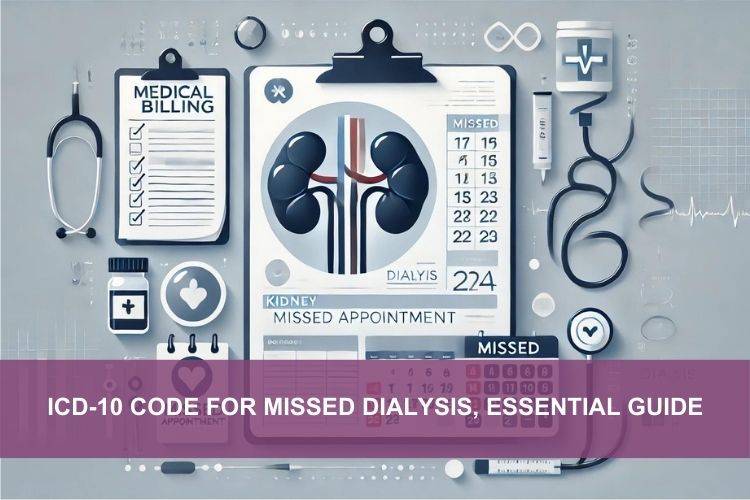ICD 10 Code for Missed Dialysis plays an important role in documenting when patients miss their dialysis appointments. This isn’t just about paperwork using the right codes helps healthcare providers keep track of these missed treatments, ensuring patients get the follow-up care they need. It also makes sure that the healthcare facility is reimbursed appropriately for the care they provide.
Missing dialysis can result in serious health risks, such as fluid overload or dangerously high potassium levels, which can be life-threatening. For those handling medical billing, correctly using this code for Missed Dialysis is crucial to avoid problems with insurance claims and ensure everything stays compliant with regulations.
Proper coding supports patient care and keeps the healthcare practice running smoothly. This guide is here to help you understand these key codes and use them correctly, so missed dialysis cases are managed effectively.
Key Aspects of the ICD 10 Code for Missed Dialysis
Properly documenting missed dialysis sessions is vital for effective patient care and accurate billing. The ICD 10 Code for Missed Dialysis and associated codes for complications help healthcare providers manage and record these incidents correctly.
The Significance of Accurate Coding in Missed Dialysis
Accurate coding of missed dialysis is essential for maintaining thorough patient records and ensuring correct reimbursement. Wrong coding can result in claim denials and insufficient patient management.
Essential ICD-10 Codes for Documenting Missed Dialysis
Several ICD-10 codes are important for accurately documenting missed dialysis cases:
| ICD-10 Code | Description |
| Z91.15 | Indicates noncompliance with renal dialysis |
| E87.70 | Represents fluid overload, often a result of missed dialysis |
| E87.72 | Used for hyperkalemia that occurs due to missed dialysis |
Complications Arising from Missed Dialysis
Missing dialysis sessions can result in significant health complications, which must be accurately recorded using the appropriate ICD-10 codes. Correct coding is essential for both patient care and accurate billing.
ICD-10 Code for Fluid Overload Due to Missed Dialysis (E87.70)
Fluid overload is a common issue when dialysis is missed, leading to an accumulation of excess fluid in the body. The ICD-10 code E87.70 is designated for documenting fluid overload caused by missed dialysis sessions. This code is critical for accurately reflecting the patient’s condition, enabling proper management, and ensuring correct reimbursement. Precise documentation of fluid overload is essential, as untreated, it can lead to serious health consequences.
ICD-10 Code for Hyperkalemia Resulting from Missed Dialysis (E87.72)
Hyperkalemia, characterized by elevated potassium levels in the blood, is another dangerous complication associated with missed dialysis. The ICD-10 code E87.72 is used to document hyperkalemia that occurs as a result of missed dialysis. Accurate coding of hyperkalemia is crucial, as this condition requires immediate intervention to prevent life-threatening outcomes. This code helps healthcare providers ensure that the seriousness of the condition is properly recorded, supporting both patient care and accurate billing practices.
Essential Practices for Healthcare Providers and Coders
Adopting essential practices of documenting missed dialysis cases is key to ensuring accurate coding and regulatory compliance. These practices help maintain high standards in patient care and streamline billing processes.
Effective Documentation for Missed Dialysis
Proper documentation of missed dialysis sessions is crucial for accurately capturing the patient’s condition and the care provided. Healthcare providers should document the reasons for missed sessions of any complications such as fluid overload or hyperkalemia.
Maintaining Compliance with Regulatory Requirements
Ensuring compliance with regulatory requirements in coding and documentation is critical for avoiding audits and legal issues. Healthcare providers and coders must stay informed about the latest coding guidelines and ensure that all documentation related to missed dialysis is accurate and complete. This includes correct use of the ICD 10 Code for Missed Dialysis (Z91.15) and associated codes.
The Importance of Medical Billing Specialists in Handling Missed Dialysis Cases
Medical billing specialists play a vital role in ensuring that missed dialysis sessions are documented and coded accurately which is essential for proper reimbursement and adherence to healthcare standards.
Working Together with Healthcare Providers for Precise Coding
Close collaboration between medical billing specialists and healthcare providers is essential for the accurate coding of missed dialysis cases. Specialists must ensure all necessary details, including the reasons for missed sessions and any complications like fluid overload or hyperkalemia, are documented. Correctly using ICD-10 codes—Z91.15 for missed dialysis, E87.70 for fluid overload, and E87.72 for hyperkalemia—ensures that the full scope of the patient’s condition is captured and supports accurate billing.
Preventing Common Errors in Coding for Missed Dialysis
Avoiding common coding errors is key to preventing claim denials and maintaining compliance. Billing specialists should ensure the correct application of the ICD 10 Code for Missed Dialysis (Z91.15) and related codes. Mistakes such as incorrect code sequencing or incomplete documentation can lead to issues in the billing process and potential financial setbacks for the healthcare facility.
Conclusion
Accurate coding for missed dialysis is critical for ensuring proper patient care and appropriate reimbursement for healthcare facilities. Utilizing the correct ICD-10 codes, such as Z91.15, E87.70, and E87.72, ensures precise documentation and regulatory compliance. Close collaboration between healthcare providers and billing specialists helps avoid errors and ensures all related complications are thoroughly documented. By following these best practices, healthcare professionals can prevent claim denials, maintain compliance, and enhance patient outcomes, ultimately protecting both patient health and the financial stability of their practice.
FAQs
What is the ICD 10 Code for Missed Dialysis?
The ICD 10 Code for Missed Dialysis is Z91.15. It is used to document cases where a patient fails to comply with their prescribed renal dialysis schedule, ensuring accurate records and proper follow-up care.
How do I code fluid overload due to missed dialysis?
To code fluid overload caused by missed dialysis, use ICD-10 code E87.70. This code captures the condition accurately, supporting effective patient management and proper billing.
Which code is used for hyperkalemia caused by missed dialysis?
ICD-10 code E87.72 is used to document hyperkalemia, a potentially life-threatening condition, that occurs due to missed dialysis. Proper use of this code is crucial for timely treatment and accurate billing.
Why is accurate coding for missed dialysis important?
Accurate coding for missed dialysis is essential to ensure thorough patient documentation, compliance with healthcare regulations, and correct reimbursement. It also helps prevent claim denials and supports better patient care.
How can healthcare providers avoid coding errors for missed dialysis?
Healthcare providers can avoid coding errors by collaborating closely with billing specialists and ensuring the correct use of ICD-10 codes like Z91.15, E87.70, and E87.72. This approach helps maintain accurate records and compliance.



